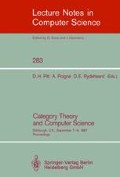Abstract
This paper studies some computability notions for abstract data types, and in particular compares cosemicomputable many-sorted algebras with a notion of finality to model minimal-state realizations of abstract (software) machines. Given a finite many-sorted signature Σ and a set V of visible sorts, for every Σ-algebra A with co-r.e. behavior and nontrivial, computable V-behavior, there is a finite signature extension Σ′ of Σ (without new sorts) and a finite set E of Σ′-equations such that A is isomorphic to a reduct of the final (Σ′, E)-algebra relative to V. This uses a theorem due to Bergstra and Tucker [3]. If A is computable, then A is also isomorphic to the reduct of the initial (Σ′, E)-algebra. We also prove some results on congruences of finitely generated free algebras. We show that for every finite signature Σ, there are either countably many Σ-congruences on the free Σ-algebra or else there is a continuum of such congruences. There are several necessary and sufficient conditions which separate these two cases. We introduce the notion of the Turing degree of a minimal algebra. Using the results above prove that there is a fixed one-sorted signature such that for every r.e. degree d, there is a finite set E of Σ-equations such the initial (Σ, E)-algebra has degree d. There is a two-sorted signature Σ0 and a single visible sort such that for every r.e. degree d there is a finite set E of Σ-equations such that the initial (Σ, E, V)-algebra is computable and the final (Σ, E, V)-algebra is cosemicomputable and has degree d.
The research reported here was supported in part by a gift from the System Development Foundation.
The research reported here was supported in part by Office Of Naval Research Contracts N00414-85-C-0417 and N0014-86-C-0450.
Preview
Unable to display preview. Download preview PDF.
6 References
Bergstra, J.A. and J.-J. Meyer, I/O-Computable data structures. SIGPLAN Notices, vol. 16, no. 4 (1981), pp. 27–32.
Bergstra, J.A. and J.V. Tucker, Algebraic specifications of computable and semicomputable data structures. Research Report IW 115, Mathematical Centre, Dept. of Computer Science, Amsterdam, 1979. Revised as University of Leeds CTCS Report 2.86. To appear in Theoretical Computer Science.
Bergstra, J.A. and J.V. Tucker, Initial and final algebra semantics for data type specifications: two characterisation theorems. SIAM J. Comput., vol 12 (1983), pp. 366–387.
Bergstra, J.A. and J.V. Tucker, Characterization of computable data types by means of a finite equational specification method. In J. W. de Bakker and J. van Leeuwen (eds.), Automata, Languages and Programming, Seventh Colloquium, Noordwijkerhout, Springer Lecture Notes in Computer Science, vol. 81 (1980), pp. 76–90.
Giarrantana, V., F. Gimona, and U. Montanari, Observability concepts in abstract data type specification. Mathematical Foundations of Computer Science '76, Springer Lecture Notes in Computer Science, vol. 45, pp. 576–587, 1976.
Goguen, J.A., Realization is universal. Mathematical System Theory, vol 6 (1973), pp. 359–374.
Goguen, J.A. and J. Meseguer, Completeness of many-sorted equational logic. Algebra Universalis vol. 11 (1985), no. 3, pp. 307–334. Extended abstract appeared in SIGPLAN Notices, July 1981, vol. 16, no. 7, pp. 24–37.
Guttag, J.V., The Specification and Application to Programming of Abstract Data Types, Ph.D. Thesis, University of Toronto, 1975. Computer Science Department, Report CSRG-59.
Huet, G. and D.C. Oppen, Equations and rewrite rules. In R. Book (ed.), Formal Language Theory, Academic Press, 1980, 350:405.
Majster, M.E., Data types, abstract data types and their specification problem. Theoretical Computer Science, vol. 8 (1979), pp. 89–127.
Malcev, A.I., Constructive algebras I, Russian Mathematical Surveys 16(3), 1961, pp. 77–129.
Meseguer, J. and J.A. Goguen, Initiality, induction, and computability. In M. Nivat and J. Reynolds (eds.), Algebraic Methods in Semantics, pp. 459–541, Cambridge University Press, 1985. Also appeared as SRI CSL Tech. Rep. 140, 1983.
Rabin, M., Computable algebra: general theory and theory of computable fields. Transactions of the American Mathematical Society 95(1960), pp. 341–360.
Rogers, H., The Theory of Recursive Functions and Effective Computability, McGraw-Hill, New York, 1967.
Wand, M., Final algebra semantics and data type extension. J. Comp. Sys. Sciences, vol. 19 (1979), pp. 27–44.
Author information
Authors and Affiliations
Editor information
Rights and permissions
Copyright information
© 1987 Springer-Verlag Berlin Heidelberg
About this paper
Cite this paper
Moss, L.S., Meseguer, J., Goguen, J.A. (1987). Final algebras, cosemicomputable algebras, and degrees of unsolvability. In: Pitt, D.H., Poigné, A., Rydeheard, D.E. (eds) Category Theory and Computer Science. Lecture Notes in Computer Science, vol 283. Springer, Berlin, Heidelberg. https://doi.org/10.1007/3-540-18508-9_25
Download citation
DOI: https://doi.org/10.1007/3-540-18508-9_25
Published:
Publisher Name: Springer, Berlin, Heidelberg
Print ISBN: 978-3-540-18508-6
Online ISBN: 978-3-540-48006-8
eBook Packages: Springer Book Archive

